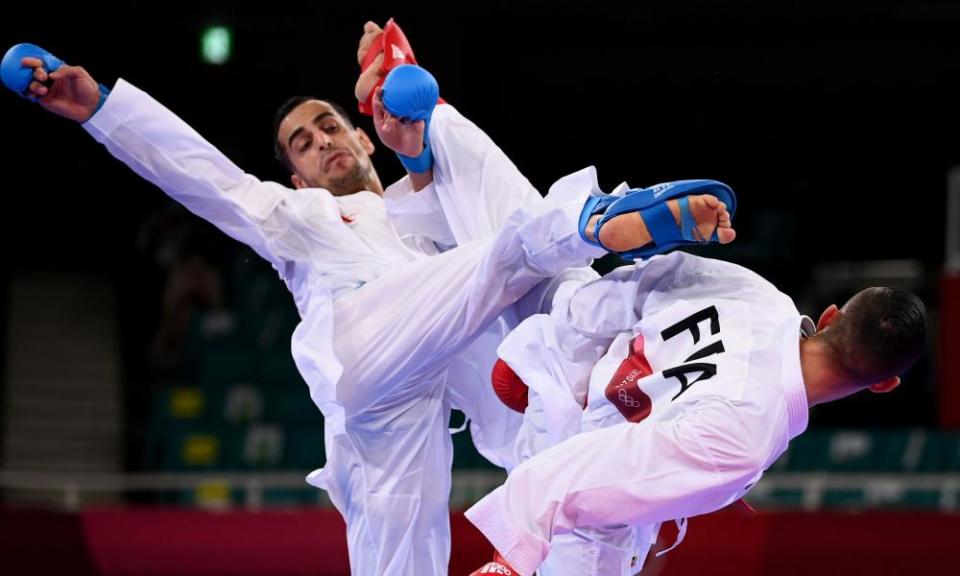Olympics enter the Budokan with karate kicking and screaming

Tucked away in the heart of Kitanomaru park, built on ancient Edo period castle grounds and a leisurely walk from the Imperial Palace, the Nippon Budokan sits handsomely. The Budokan, as it is known, has had many uses over the years, from Led Zeppelin concerts to Muhammad Ali’s hybrid rules fight with Antonio Inoki, that it is often difficult to keep track.
But in a world of failed Olympic legacies and discarded stadiums, its initial reason for existence remains relevant as ever. The arena was built just in time for the 1964 Olympics, when it was the first site of judo’s enduring presence in the Games. It has become a notable venue for martial arts. On Wednesday, it assumed a similar role as in 1964 by welcoming karate into the Olympic Games.
Related: Tokyo 2020 Olympics: athletics, basketball, GB’s 16th gold and more – live!
The island of Okinawa is where karate’s heart resides and its first Olympic showcase is a consequence of its popularity here. Over the final days of the Olympics two distinctive styles are on show. In the kata, as demonstrated in the early rounds of the women’s competition on Thursday morning, the karatekas choose from 102 predetermined series of techniques and perform them with as much precision and dynamism as they can.
What seems difficult to follow in theory is relatively easy. The two outstanding performers were clear, with the speed of Japan’s Kiyou Shimizu instantly distinguishing her in her pool. She was joined in the final by the dominant power of Sandra Sánchez, the 39-year-old undisputed No 1 who is widely considered the greatest of all time in her category and who duly clinched the gold medal.
Alongside kata were the numerous kumite bouts, a more familiar spectacle of one-on-one combat. In three-minute bouts, the aim is to land blows at the opponent, but judges decide whether the techniques are sufficient enough to count as a point. Every blow landed was punctuated by “kiai” – the energy-harnessing screams that circled the Budokan throughout.
All the participants have hopes for what the new eyes on karate will bring. For Sakura Kokumai, an American with familial roots in Japan who lost a heart-wrenching bronze-medal kata bout, her will is to be seen as a true athlete.
“We’ve been doing this for the love of our sport and martial art,” said Kokumai, who attended the Budokan many times before the Games when she studied in Japan. “I really hope people are able to see what we do as athletes. We train very hard just like any other athlete and I believe we belong here in the Olympics.”
Jesús del Moral, Sanchez’s coach and husband, stressed the importance of increased participation. “I like to tell them that karate is for everybody,” he said. “Everybody can practise. The sport is important but not all. I think it’s the way to show the world what karate is. It doesn’t matter the age, the sex. Anybody can practise.”

It was difficult not to be drawn in by the journey of Hamoon Derafshipour, an Iranian karateka and a world championship bronze medallist in 2018. While all other competitors entered the arena before their bouts with male, and often older, coaches by their sides, Derafshipour was accompanied by his wife, Samira Malekipour.
That is rare in any men’s sport, but the pair’s route to this moment could not be more unique. They decided to leave their home country in 2019, emigrating to Canada where he would have the agency to elect Malekipour as his coach. He secured his Olympics berth as a member of the Refugee Olympic Team and he arrived in Tokyo intending to win a medal.
But he endured a tough day in Thursday’s kumite bouts in the -67kg competition. He won two and lost two, finishing in third bewhen the top two advance to the semi-final. In his final bout, already eliminated, Derafshipour suffered a bloody lip, had his gumshield fly out on to the carpet numerous times and took one particularly heavy blow as he clinched his second win.
He was already crying as he walked off the competition floor. When he reached the mixed zone area, he kneeled on the ground and sobbed loudly. He understandably did not stop for an interview. His tears were a reflection of the sacrifices made and the importance of this competition despite it holding no history in the sport.
But perhaps also of the fleeting chance this is for all. Karate will not be in the 2024 Paris Olympics. For those who did not perform to their standards, this opportunity may never come again.

 Yahoo Sport
Yahoo Sport 





































